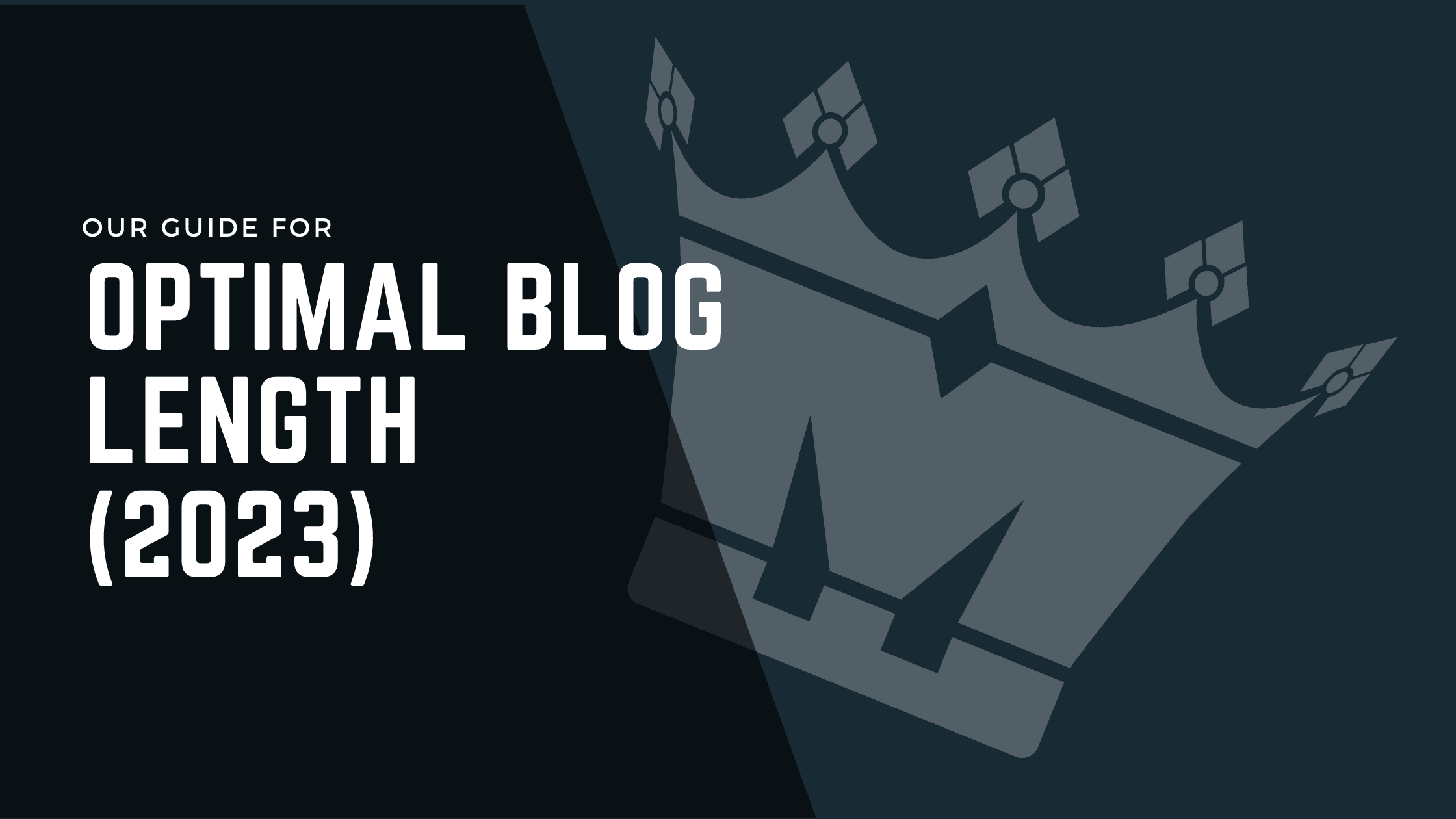How Long Should a Blog Article Be? Optimal Length for 2023
SEO is a field that’s constantly changing. While the highest SERPs years ago were in-depth, long articles, the reality today is that long-form and short-form articles have the same chances of ranking.
But how long should a blog article be? Is there a universal rule for all types of search queries? Is there something you can do to increase the chances of ranking higher on search engines?
Let’s jump into the SEO practices and statistics and see what they say about the article length in 2023.
Ideal Length of an Article
Figuring out how long your blog post should be no easy feat. As with everything else in SEO, there is no one-size-fits-all answer about the article’s length. However, there are different recommendations you can use as a guide.
So, how long should a blog article be?
Backlinko claims that the average first result when searching a Google keyword is 1,447 words. The average word count can be a good starting point for the article length.
However, the experts have different opinions regarding a general ideal blog post length.
For instance, the industry research from Wix shows that the sweet spot for post length is 2,450. Broadly speaking, a blog article should range between 1,500 and 2,500 words.
On the other hand, the findings of Semrush indicate that blog articles with more than 3,000 words have the highest organic traffic. Right behind them are posts ranging from 2,000 and 3,000 words. This is understandable since long posts are more likely to get backlinks and shares.
Lastly, HubSpot notes the optimal word count is between 2,100 and 2,400. As a reference, they used articles as short as 333 words and up to 5,571 words. HubSpot also found out that 16 of their top 50 most-read posts were under 1,500 words. This indicates that shorter posts can also rank.
In theory, this generalization is excellent for newbies in the SEO sector; the reality is different. Considering that a blog post article should be straight to the point, without fluff, we can agree that there are topics where 500 words are more than enough.
In some cases, it is better to keep it simple and short instead of going off-topic or explaining the same thing multiple times to reach a higher word count. When there’s nothing important left to say, don’t force it.
Remember that the quality of your content has significant importance in SEO. The following table shows how long a blog article should be according to the content type.

Important note: Your optimal article length may not be the same as for other pages. You should use the numbers from the table as a general guide and create data-driven blog posts.
Minimum SEO Article Length
As with the ideal article length, there is no rule on the minimum number of words you should use in an article.
Honestly, you have to give Google something to crawl and rank. Writing less than 150 words and expecting results is somehow unreal.
The SEO experts at Yoast suggest product descriptions with a minimum of 200 words. Additionally, they recommend you publish regular posts and pages with at least 300 words.
Is the Blog Post Length Important in SEO?
Google has clarified that your article’s word count is not a direct ranking factor. But that doesn’t mean that the length of a blog post is not connected with other SEO metrics.
It is always a good idea to follow the recommendations about the article's length. Writing a comprehensive blog post typically requires a higher word count.
Consequently, with increased article authority, relevancy, and high-quality content, you will get more backlinks and shares, influencing your ranking.
Key Considerations for Blog Article Length
The blog article length goes hand in hand with other SEO-related queries. The total number of words you will write is directly associated with your goal, the search intent, your audience needs, your keyword strategy, and the length of the top-ranking SERPs.
Define your intention
Everything in SEO is done for a reason. Therefore, you need to figure out what you want to achieve with the blog post you have in mind.
Is it to rank in the first 10 places when your audience types the keyword? Is it to attract social media traffic? Do you want to promote a new product? Or do you just want to get leads?
You can determine the article's length only with a clear goal.
For instance, if you want to rank your page, writing an in-depth article with an average length might be a good idea.
Know your audience
You are writing a blog article that people should read and understand. Don’t get hung up on the Google Algorithm and forget about your audience.
When you are looking for the answer to the question “How long should a blog article be?”, always have in mind these sub-questions.
- Who is your target audience? Consider their age, education, and economic, social, and educational background.
- What level of prior knowledge does the audience have about the topic? According to your keywords, you should have a general sense of when the readers need an additional explanation of your terms. For instance, if you are writing about “The Cheapest VPN,” defining what a VPN is is unnecessary.
- What answers are the readers seeking? Outline the possible interest of the audience and why they are making the search query. Put yourself in their shoes and ask yourself what information would be useful if you were typing the keyword.
- How should I approach my audience? Your writing tone is extremely important. You can use a friendly voice when writing “How to” guides or promoting a product, but you must sound reliable when writing about tax returns.
- How can I keep the interest of the readers? The art of writing is keeping people’s interest. Find out what the audience is interested in and write about it. Try to hook them up and keep their attention.
Find out the search intent
A query can have four basic search intents: navigational, transactional, informational, and commercial. Your job is to create an article that corresponds with the search intent of your target group.
- Navigational search intent: the user seeks a specific place or website.
- Transactional search intent: the user is trying to perform a specific action.
- Informational search intent: the user is looking for information about a specific topic.
- Commercial search intent: the user wants to gather more details on a product/service to help him choose different options.
Analyze your competition
Assessing the competition, their word count, and subtopics can greatly help you. The first 10 SERPs have proven they are value-driven articles; you can learn a lot from them.
Analyze the keywords they target and the structure they use. Add everything you think will be important for the reader and remove irrelevant information.
Ideally, if the best SERPs have a word count ranging from 1,500 and 2,000, you should also aim for that number.
We are not indicating that you should paraphrase your competition. Be creative. Add your twist to the topic. Provide value.
Using a keyword strategy
Before you start writing on a topic, you should do keyword research. You don’t want to end up in a situation where you are writing and posting something nobody is googling.
Detailed keyword research can help you rank higher on search results. You will be sure that you are creating useful content.
Ahrefs suggests you use one primary keyword and multiple secondary keywords. But what does that mean?
You should pick one primary keyword, which will be the topic of your blog post. Ensure your main keyword is clearly defined and you put your focus on that matter.
When it comes to secondary keywords, they should be in close relation to your main keyword. You can use synonyms and long-tail keyword variations as secondary keywords.
The purpose of the secondary keywords is to help you write a thorough blog post covering all relevant subtopics.
Long vs. Short Blog Articles
Long blog posts
If you choose to write a long blog post on a given topic, you should know what to expect. Here is a list of the pros and cons to help you create high-quality content.
You can leverage the following advantages of long blog articles.
- Possibility to cover the subject comprehensively.
- Better chance of more backlinks.
- Long content usually has higher authoritativeness and trustworthiness.
- A higher value for the target audience.
- You can use more keywords.
The disadvantages of long blog posts are:
- It is easier to lose the reader’s focus.
- Longer articles require more time.
- If you are careless, you can create an article without flow.
Short blog posts
Short-form blog posts are equally important in the SEO niche. However, they have their pros and cons.
Here are some of the advantages of short blog posts.
- They are reader-focused and easy to consume.
- Take less time to write.
- Excellent for grab-and-go search queries.
- They can be easily paired with infographics and other media strategies.
- The reader will spend less time finding what he needs.
The disadvantages of short blog posts you should look out for are:
- Lack of information
- Lower chances of getting backlinks
- Higher competition.
FAQs
What is considered a short blog?
As a rule of thumb, a short-form blog post has a word count between 300 and 600. Short articles are typically good for social shares, discussion opening posts, announcements, and press releases.
Are 1,000 words too short for a blog?
It depends on the niche you are targeting. If you have answered all of the questions your audience seeks, 1,000 words can be enough.
On the contrary, if you haven’t satisfied the search intent, dig deeper and write more on the topic.
What is a good length for a blog post?
The ideal length of your article depends on many factors, including your audience needs, topic, search intent, and type of keyword you are targeting. More often than not, the ideal length for a blog post is between 1,500 and 2,500 words.
Are shorter blogs better?
Statistically, no proof exists that shorter blogs rank higher in search results than long-form articles and vice versa. Everything depends on the industry you are writing in.
For example, you should go for a short blog post if you write informational posts like press releases, announcements, encyclopedia entries, news, and demo articles.
Conclusion
How long should a blog article be? Now that you know, you will have more time to spare on on-page and off-page SEO. No matter what type of content you are creating or what platform you are publishing it on, it is important to ensure that your blog article is long enough to cover all aspects.
Don’t be discouraged if you don’t see the results of your work promptly. SEO ranking takes time. You must be open to learning new things and adapting your page, so it is up to date with the newest trends.
Don’t be the one who religiously follows the article's length recommendations. At the end of the day, they are only general recommendations. You should write as many words as necessary without going off-topic and repeating yourself.
Finally, don’t be afraid to spend more time on research. Focusing on relevant and high-quality content is key to mastering SEO.


